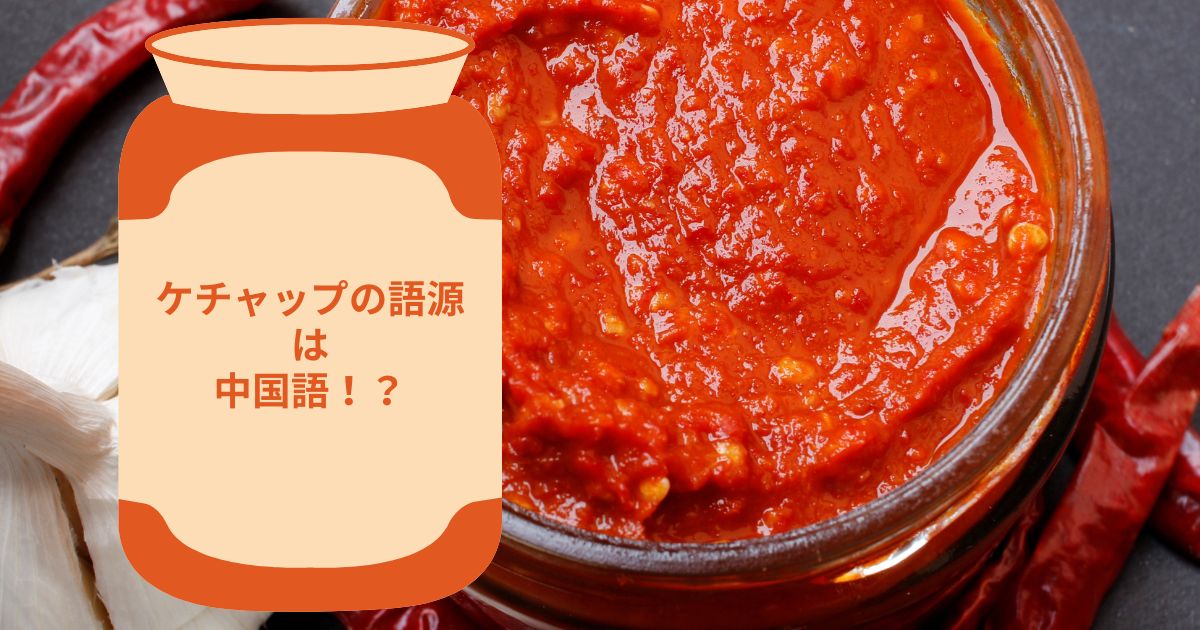🍅 ケチャップの語源
ハンバーガーやフライドポテトに欠かせない「ケチャップ」。
その甘酸っぱい赤いソースを知らない人はいないでしょう。
でも…その名前のルーツが中国語(しかも魚醤)にあるって、ご存知でしたか?
ケチャップは「魚のソース」だった?
ケチャップの語源は、中国南部で話されている福建語(Hokkien)で「kê-tsiap(鮭汁)」という言葉にさかのぼります。
これは、発酵した魚から作られる調味料の名前。
今で言うところの「魚醤」に近いもので、東南アジアの料理によく使われていたそうです。
ヨーロッパへ渡ったアジアの味
17世紀頃、ヨーロッパの貿易商人たちはアジアでこの魚醤に出会い、その風味に魅了されました。
やがて「kê-tsiap」という名前は英語に取り入れられ、
「ketchup(ケチャップ)」としてヨーロッパでも知られるようになります。
🍅 トマトとの出会い
当時のヨーロッパでは、トマトはまだケチャップの材料ではありませんでした。
キノコ、クルミ、アンチョビなど、さまざまな材料で試されていたのです。
そして19世紀、アメリカでトマトを使ったケチャップのレシピが登場し、次第に私たちが知っている「トマトケチャップ」へと変化していきました。
言葉は旅をする
こうしてみると、「ケチャップ」という一つの言葉の中には、アジアの発酵文化、ヨーロッパの料理の探求、アメリカの大量生産文化までが詰まっています。
まさに、言葉も味も世界を旅して変わっていくという素敵なストーリーですね。
おわりに
私たちが何気なく使っている「ケチャップ」も、実は中国語から始まった長い物語を持っています。
今度ケチャップを使うときは、そのルーツにちょっと思いをはせてみてはいかがでしょうか?
言葉の歴史を知ると、いつもの食事がちょっと特別なものになるかもしれません。
参考にした記事
- NextShark: Ketchup’s Surprising Asian Origins
英語でケチャップの歴史を学んでみましょう
CEFR A1
Where does ketchup come from?
Ketchup is a red sauce. It is sweet and sour.
Many people eat it with fries or hamburgers.
But long ago, ketchup was not tomato sauce.
It came from Asia.
Ketchup was a fish sauce.
It was salty and dark.
The word “ketchup” came from a Chinese word: kê-tsiap.
Traders from Europe found the sauce in Asia.
They took the idea back to Europe.
Later, in America, people made a new ketchup.
They used tomatoes, sugar, and vinegar.
This is the ketchup we eat today.
Ketchup changed a lot, but it is still popular.
Now, people around the world use ketchup every day.
CEFR A2
The story of ketchup
Today, ketchup is a sweet red sauce.
We eat it on fries, hamburgers, and many other foods.
But the first ketchup was not made from tomatoes.
It was a salty fish sauce from Asia.
The word “ketchup” comes from the Chinese word kê-tsiap.
Traders from Europe found this sauce in Southeast Asia.
They liked it and brought it back to Europe.
Later, American people made a new kind of ketchup.
They used tomatoes, sugar, and vinegar.
In 1812, a man in America wrote the first tomato ketchup recipe.
After that, tomato ketchup became very popular.
Today, ketchup is used all around the world.
It is in restaurants, homes, and even school lunches.
Ketchup has a long and interesting history.
It started as a fish sauce and became a world-famous tomato sauce.
CEFR B1
The surprising history of ketchup
Most people know ketchup as a sweet red sauce made from tomatoes.
But its history is more interesting than you might think.
The word “ketchup” comes from kê-tsiap, a Chinese term for a fermented fish sauce.
This sauce was used in Southeast Asia hundreds of years ago.
European traders discovered it and brought the idea back to Europe.
At first, ketchup in Europe was made from mushrooms, nuts, or fish.
In the early 1800s, Americans began making ketchup with tomatoes, sugar, and vinegar.
In 1812, the first tomato-based ketchup recipe was published in the U.S.
This version quickly became popular.
Today, ketchup is a symbol of American food culture.
It is found in homes and restaurants all over the world.
From Asia to America, ketchup has changed a lot, but it is still loved by many.
CEFR B2
Ketchup’s Global Journey from Fish Sauce to American Icon
Ketchup is often seen as a classic American condiment, served with fries, burgers, and more.
But its roots go far beyond the U.S., reaching back to Southeast Asia.
The word “ketchup” originates from the Hokkien Chinese word kê-tsiap, which referred to a fermented fish sauce.
This salty, umami-rich sauce was common in Asian cooking.
European traders encountered it in the 1600s and brought it to Europe.
At first, Western versions of ketchup had no tomatoes—they were made from mushrooms, nuts, or anchovies.
In 1812, James Mease, an American scientist, published the first known tomato ketchup recipe.
Over time, the tomato-based version became more popular, especially in the U.S., where it eventually became a household staple.
Today, ketchup is manufactured and consumed worldwide, with billions of bottles sold each year.
Its transformation—from a Chinese fish sauce to a global tomato-based condiment—is a fascinating example of how food travels and evolves across cultures.







































